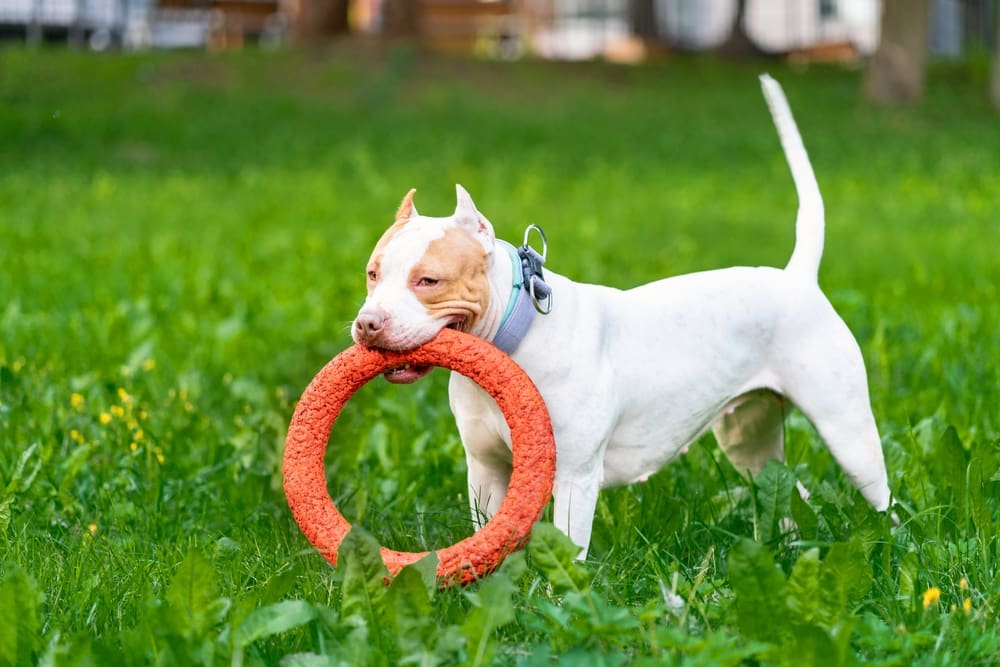A pitbull can make a great service dog, even though many people believe they are not suited for service work. The Americans with Disabilities Act (ADA) does not restrict which breeds qualify as service dogs, so pitbulls have the same potential as any other breed.
Before choosing a pitbull for service work, however, it’s important to understand what makes a good service dog. Pitbulls are strong, intelligent, and caring animals capable of performing many tasks well. Success depends on consistent, proper training and selecting the right individual dog.
Service dog work is more than just having a pet. Your pitbull will need specialized training to assist with your disability, which takes time, money, and commitment from both you and your dog. The role of pitbulls in service work is somewhat different from that of other breeds.
So, can a pitbull be a service dog? Let’s take a look.
Getting a Pitbull Service Dog
Getting a service dog is a lengthy process. There are several ways to obtain a service-trained pitbull. In all cases, the first step is to provide documentation of your disability that qualifies you for a service dog. After that, you will need a dog trained to perform the specific tasks that help you manage your disability.
You can obtain a service dog tailored to your specific needs from training organizations, some of which specialize in working with high-energy breeds like pitbulls. These dogs come fully trained and ready to assist you.
Alternatively, you have the option to train your own pitbull. However, this is generally not recommended for service work, especially with pitbulls, because it requires a particular skill set along with a significant investment of time and effort from both you and your dog. If you have prior experience training dogs, self-training might be an option and could help reduce costs, but in most cases, professional training is the better choice to make sure the dog is properly prepared.
The Cost of a Pitbull Service Dog
A fully trained service dog from an organization can cost between $15,000 and $30,000. Some organizations offer dogs for free, but the wait time is usually between two and four years.
If you decide to train your own pitbull, the cost can range from $5,000 to $15,000. This includes professional training, equipment, and veterinary bills. You will also need to buy toys, food, and training supplies throughout the training process.
Training a Pitbull for Service Work
There are many structured programs that teach essential skills like obedience, task training, and public access etiquette. For self-training, make sure you focus on positive training methods, also called rewards-based learning, that use treats, praise, and play. Using punishment or harsh training with your pitbull can introduce issues with fear and a lack of confidence, and should generally be avoided.
The sooner you start training your puppy, the easier it will be for them to learn. Puppies pick up new skills faster than adult dogs. It is important to practice training every day. Short, focused sessions work better than long ones because long sessions can tire your dog and make them less interested in learning.
Professional help plays an important role in service dog training. Choose a trainer experienced with pitbulls who understands ADA laws and service dog requirements. Use online resources and communities to confirm you are following the right steps. Online training programs can be a helpful alternative when in-person training is not possible.
What Makes Pitbulls Unique?
Pitbulls are extremely strong, dedicated dogs that love to please their owners. Their high energy and hunger for jobs make them very good candidates for service work. Of course, not every pitbull will work well as a service dog.
This is why it’s important you pick a dog that is calm and eager to learn. Pitbulls were originally bred to be working dogs, so their athleticism and ability to bond with owners help them a lot in this career.
What really sets them apart, however, is their ability to understand their handler’s emotions and needs, often anticipating the tasks they need to do. This breed’s unwavering loyalty creates an unbreakable partnership between you two that helps them stay alert and mind your safety without displaying aggressive behavior.
The Role of Socialization
Any pitbull that becomes a service dog will need to be calm, focused, and confident, since all service dogs have to pass tests that prove they can maintain their composure around other dogs and focus on their duties.
This means that the right pitbull will prove to be confident but not dominating. They’ll be friendly with strangers as well as other animals. Showing signs of either too much fear or aggression means your service dog is failing at their job.
Proper training for a service dog includes learning to handle distractions that can affect their performance. Common distractions include other animals nearby, as well as strangers or children trying to pet or touch them.
Size and Physicality
Pitbulls have a lot of stamina and endurance. They’re agile dogs that take great satisfaction in performing tasks that help their owners. Even besides service work, they’ll need at least an hour of exercise a day, as getting bored can lead them to destructive behavior or generally being unfocused.
Most pitbulls weigh between 35 and 65 pounds, and they stand at about 17 to 21 inches tall at the shoulder, with males usually being bigger than females. Their medium build makes them versatile for a great deal of tasks. They’re big enough to perform mobility work and small enough to fit in your average car and home.
Grooming Needs
Pitbulls have short coats that are easy to maintain. Brushing them once a week is enough to remove loose hair. Since this is a working dog, keeping them clean and well-groomed is important. Make sure you give regular baths, trim their nails, and clean their teeth.
It is also important to clean your pitbull’s ears regularly because they can be prone to ear infections. Brushing their teeth regularly and giving dental chews will help maintain good oral health. Consider professional grooming every few months to catch anything you might miss and keep your service dog clean and healthy in public.
Life Expectancy and Health
Pitbulls generally live between 12 and 16 years, and with proper care, some live even longer. This means you can expect many years of service from your dog. The breed is prone to hip problems, heart issues, and skin allergies. It is your responsibility to watch for any signs of these conditions and take your service dog to the vet regularly to catch problems early.
Breeders who follow responsible practices lower the risk of these health issues. That is why it is important to get your puppy from a responsible breeder or a rescue that performs thorough health testing. After adoption, you can manage your pitbull’s health by providing balanced nutrition and regular veterinary care.
Are Pitbulls Difficult to Handle?
Pitbulls are strong and intelligent dogs that require experienced handling. Expecting service dog-level training from a dog that hasn’t been bred or prepared for it is unrealistic and can lead to problems.
The best approach is to work with a professional trainer or consultant, especially if you are new to training service dogs. Consistency and firmness are essential because pitbulls tend to test boundaries and need clear rules to follow.
Service Dogs’ Legal Rights
Since the ADA does not restrict which breeds qualify as service dogs, you can train almost any dog to be your service dog. Landlords cannot refuse your service dog based on its breed, so your pitbull has the same rights as any other service dog.
You can take your pitbull service dog with you anywhere the public is allowed, including restaurants, planes, and hotels.


Can a Pitbull Be a Service Dog? Absolutely
Pitbulls can be excellent service dogs, as long as they get proper training and have the right attitude. If possible, choose a pup rather than a dog, and commit to years of training together. Think about your disability needs and the tasks you’ll need your service dog to perform because not every service pitbull can perform the same job.
Professionals who understand pitbulls and service dog training will be instrumental in helping you achieve your goals with your pitbull.
It’s important to understand that the breed of your service dog does not matter as much as their temperament and attitude, which can vary widely from dog to dog. A well-trained pitbull can be just as good at performing service work as any other breed, so don’t let their breed deter you from getting one.




